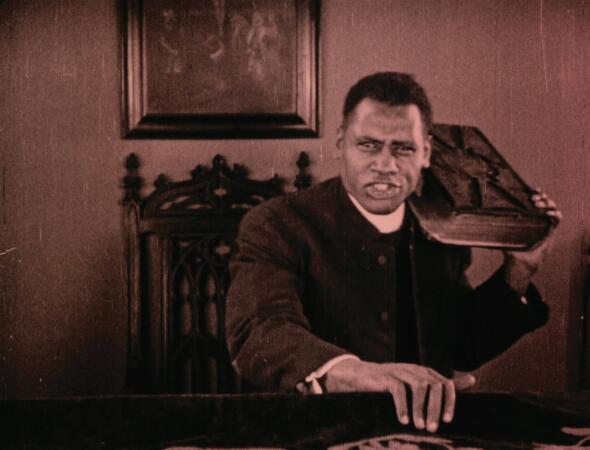
Pioneering filmmaker Oscar Micheaux’s 1925 film “Body and Soul” was one the first 12 films that he made, from his start as a director in 1919; though it’s only one of three from that period for which a print still exists. It is the film that firmly established what could be called the “Micheaux style,” and a seminal film in the history and advancement of black cinema.
Starring a young Paul Robeson in his very first film role, “Body & Soul” is an odd mix, a soap opera, while also being a scathing indictment of the hypocrisy of the black church. In the film, Robeson plays an escaped prisoner who passes himself off as a preacher to swindle the population, until a woman, who he previously sexually assaulted, reveals him for the fraud that he is, in front of the entire congregation.
Actually, that’s one version of the film. In the original version, Robeson’s con man preacher has a twin brother who is in love with one of his brother’s victims. Micheaux was forced to re-edit the film when the New York film censorship board refused to approve it for theatrical showings, claiming that the film would “tend to incite to crime” and was “immoral” and “sacrilegious”.
However, the version that exists is still a very important and groundbreaking film, and one of the best films that Micheaux ever made. And in 2015, a compelling new jazz score for the film – written by composer/conductor Renee Baker – made its successful debut to rapturous response, including a memorable screening at the Ebertfest Film Festival last year.
According to the producer and artistic director of the “Body and Soul” project, Don DiNicola, Ms. Baker’s approach in writing a new score for the film “was to break down the film into individual scenes and then analyze the dramatic content and narrative function of each scene. This opened a door to a new understanding of what we believe what Oscar Micheaux was trying to achieve with his unique approach to narrative film structure. In many ways, this prescient approach anticipates what is being done in filmmaking today.
He also added that, “the narrative doesn’t rely solely on correcting racial stereotypes of the times. It delivers its message with a complex moral tinge that was frank and honest to the point where even the African American audience was shocked to see a preacher portrayed in such a morally ambiguous light. Micheaux was a pioneering filmmaker who’s reputation deserves rescuing from the ‘race film’ categorization.”
At the inaugural event of the Chicago Symphony Orchestra’s (CSO) new initiative, The African American Network (AAN), there will be a screening of “Body and Soul” with Ms. Baker’s score performed live by members of the CSO orchestra, at the Orchestra Hall in Chicago, this Saturday Feb. 25, starting at 3PM. It’ll be followed by Ms. Baker doing a Q&A with the audience.
With the AAN, the CSO plans to reach out to Chicago’s African American community: “through the sharing and exchanging of unforgettable musical experiences. The AAN seeks to serve and encourage individuals and families; educators and students; musicians and composers; and churches and businesses to experience the timeless beauty of music.”
For more info and where to get tickets go here.

